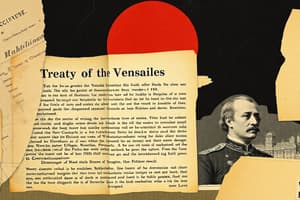Podcast
Questions and Answers
What was the primary purpose of the Treaty of Versailles?
What was the primary purpose of the Treaty of Versailles?
- To establish a new government in Germany
- To impose harsh terms on Germany as punishment (correct)
- To unite the Allied Powers and Germany
- To provide economic aid to Germany
Which country primarily imposed the harsh terms of the Treaty of Versailles on Germany?
Which country primarily imposed the harsh terms of the Treaty of Versailles on Germany?
- France (correct)
- United States
- Germany
- United Kingdom
What was one of the significant military restrictions imposed on Germany by the Treaty of Versailles?
What was one of the significant military restrictions imposed on Germany by the Treaty of Versailles?
- No air force and limited to a 100,000-man army (correct)
- Maintaining a 500,000-man army
- No restrictions on navy and air force
- Doubling its navy size
What was the total amount of reparations that Germany was required to pay under the Treaty of Versailles?
What was the total amount of reparations that Germany was required to pay under the Treaty of Versailles?
What was the primary reason for Germany's territorial losses under the Treaty of Versailles?
What was the primary reason for Germany's territorial losses under the Treaty of Versailles?
What impact did the Treaty of Versailles have on the Weimar Republic's economy?
What impact did the Treaty of Versailles have on the Weimar Republic's economy?
What was a significant consequence of the unequal distribution of wealth in the Weimar Republic's economy?
What was a significant consequence of the unequal distribution of wealth in the Weimar Republic's economy?
How did the harsh reparations imposed by the Treaty of Versailles affect the Weimar Republic's economic situation?
How did the harsh reparations imposed by the Treaty of Versailles affect the Weimar Republic's economic situation?
What role did the economic problems play in paving the way for the rise of extremist political parties in the Weimar Republic?
What role did the economic problems play in paving the way for the rise of extremist political parties in the Weimar Republic?
What was the primary result of the hyperinflation experienced by Germany during the Weimar Republic?
What was the primary result of the hyperinflation experienced by Germany during the Weimar Republic?
Flashcards are hidden until you start studying
Study Notes
Title: Unpacking Germany's Post-War Journey: Treaty of Versailles, Weimar Republic, and Economic Woes
Introduction
To understand Germany's tumultuous history after World War I, we must delve into the complex relationship between the Treaty of Versailles, the Weimar Republic, and the nation's economic woes. This article will provide an overview of the Treaty of Versailles' terms, the significant impact it had on the Weimar Republic, and the economic crisis that plagued Germany during this period.
The Treaty of Versailles (1919)
The Treaty of Versailles, signed on June 28, 1919, marked the end of World War I. It was a peace treaty between the Allied Powers and the defeated Germany. The treaty's terms were harsh and unforgiving, imposed on Germany by the Entente, primarily France and the United Kingdom.
The most notable provisions included:
- Military restrictions: Germany was limited to a 100,000-man army, no air force, and no navy.
- Reparations: Germany was required to pay reparations to the Entente countries for war damages totalling £6.6 billion.
- Responsibility: Germany was held entirely responsible for the war and its consequences.
- Territorial losses: Germany lost territory (e.g., Alsace-Lorraine) and its colonies to other nations.
The Treaty's terms were designed to punish Germany and ensure that it would never again engage in aggressive behavior. However, the terms imposed were often arbitrary and based on political motivations rather than a fair assessment of Germany's capacity to fulfill them.
The Impact of the Treaty of Versailles on the Weimar Republic
The Treaty of Versailles had a profound impact on the newly formed Weimar Republic, Germany's first democratic government. The treaty's terms created a sense of resentment and humiliation among the German people, fueling feelings of righteous indignation against the Allies.
The harsh reparations imposed on Germany created a sense of economic despair that exacerbated social and political problems within the Weimar Republic. The resulting hyperinflation and financial instability weakened the government's legitimacy, paving the way for the rise of extremist political parties, such as the Nazis.
The Weimar Republic Economy
The Weimar Republic's economy was beset by a number of problems, most notably:
- Hyperinflation: Between 1921 and 1923, the German Mark lost almost all of its value due to hyperinflation. This led to a significant decline in the purchasing power of the German people, and a crisis in the financial system.
- Unemployment: Unemployment rates were high throughout the Weimar Republic, particularly during the period of hyperinflation.
- Unequal distribution of wealth: The German economy was characterized by unequal distribution of wealth, with a small number of individuals controlling an outsized share of the nation's resources.
The economic crises of the Weimar Republic were a result of a number of factors, including the harsh reparations imposed by the Treaty of Versailles, the government's inability to manage the nation's finances effectively, and the rise of extremist political parties that undermined the government's legitimacy.
Conclusion
The Treaty of Versailles, the Weimar Republic, and the nation's economic woes are inextricably intertwined. The harsh terms imposed by the Treaty of Versailles led to significant economic problems, and the resulting social and political instability paved the way for the rise of extremist political parties. Understanding the complex relationship between these elements is crucial to understanding the dynamics of interwar Germany and the factors that contributed to the rise of the Nazi regime. To learn more about this fascinating period of history, further research on the Weimar Republic, its government, and the economic conditions of the time is recommended.
Studying That Suits You
Use AI to generate personalized quizzes and flashcards to suit your learning preferences.




